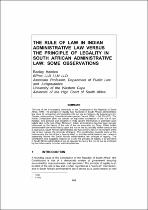| dc.contributor.author | Henrico, Radley | |
| dc.date.accessioned | 2022-05-05T08:52:11Z | |
| dc.date.available | 2022-05-05T08:52:11Z | |
| dc.date.issued | 2021 | |
| dc.identifier.citation | Henrico, Radley ‘The rule of law in Indian administrative law versus the principle of legality in south African administrative law: Some observations’ Obiter 42:3 (2021) pp. 486–498 | en_US |
| dc.identifier.issn | 2709-555X | |
| dc.identifier.uri | https://doi.org/10.17159/obiter.v42i3.12898 | |
| dc.identifier.uri | http://hdl.handle.net/10566/7353 | |
| dc.description.abstract | The rule of law is expressly mentioned in the Constitution of the Republic of South Africa, 1996. The principle of legality has flourished in South African administrative law since its recognition and reception into our law in Fedsure Life Assurance Ltd v Greater Johannesburg Transitional Metropolitan Council 1999 (1) SA 374 (CC). The Indian Constitution does not contain an equivalent expression of the rule of law. Notably, how persons and societies in India govern themselves is premised upon beliefs akin to the rule of law. Moreover, Indian administrative law has been strongly influenced by the theory of the rule of law as advocated by Dicey. Whilst Indian administrative law relies heavily upon the rule of law to judicially review conduct that is capricious, South African administrative law has come to rely on the incident of the rule of law, namely the principle of legality. | en_US |
| dc.language.iso | en | en_US |
| dc.publisher | ASSAF | en_US |
| dc.subject | Rule of law | en_US |
| dc.subject | Principle of legality | en_US |
| dc.subject | Indian constitution | en_US |
| dc.subject | Indian administrative law | en_US |
| dc.subject | South African administrative law | en_US |
| dc.title | The rule of law in Indian administrative law versus the principle of legality in south African administrative law: Some observations | en_US |
| dc.type | Article | en_US |

